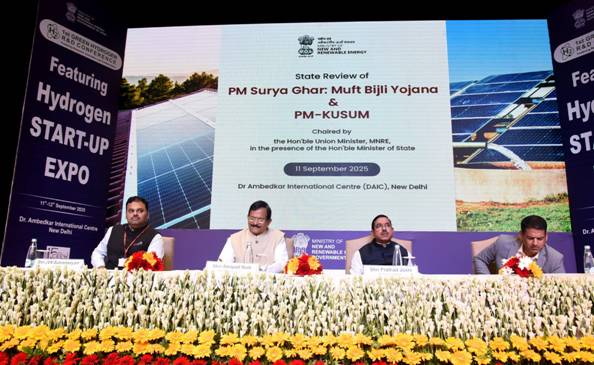The New and Renewable Energy Minister confirmed that, following requests from chief ministers for additional allocations under the PM-KUSUM scheme, its second phase will be launched after the current phase concludes in March 2026.
India is advancing towards a fully indigenous solar manufacturing ecosystem, with a target to produce Swadeshi solar cells by 2028, Union Minister for New and Renewable Energy Pralhad Venkatesh Joshi announced at a review meeting in New Delhi. The move marks a strategic shift from module assembly to domestic production of wafers, ingots, and eventually polysilicon.
“The country is now advancing beyond modules to develop domestic capacity for wafers and ingots as well, ensuring that the entire solar manufacturing ecosystem is established within India,” Joshi said. “This step will not only reduce import dependence but also generate employment, boost investment, and strengthen India’s position as a global leader in clean energy manufacturing.”
Joshi commended the efforts of state governments in accelerating renewable energy adoption, noting that India has already crossed 251.5 GW of non-fossil capacity, more than halfway to its 2030 target of 500 GW.
Highlighting the success of flagship schemes such as the PM Surya Ghar Muft Bijli Yojana, which has benefited nearly 2 million households, he urged states and distribution companies to ensure quality compliance, expedite agreement finalisation, and offer optimal tariff credits to consumers.
He also appreciated the growing popularity of the Pradhan Mantri Kisan Urja Suraksha evam Utthaan Mahabhiyan (PM-KUSUM) scheme. Launched in March 2019, the scheme seeks to reduce reliance on diesel in agriculture by supporting farmers in deploying solar pumps and grid-connected renewable energy systems for irrigation and supplementary income.
“After initial reluctance, the scheme has now gained strong momentum across states, with demand for additional allocations from chief ministers. The second phase of PM-KUSUM will be launched after the present phase ends in March 2026.”
On the issue of free electricity, Joshi emphasised the importance of financial sustainability.
“Nearly half the beneficiaries under the PM Surya Ghar Yojana are receiving zero electricity bills, demonstrating a model that combines relief for citizens with long-term sustainability.”
Accelerating Ease of Doing Business
India has achieved the milestone of 50 per cent installed electricity capacity from non-fossil sources—five years ahead of schedule. However, Joshi cautioned that capacity addition must be matched by effective utilisation.
“Timely action is the backbone of this system. If we keep delaying procurement on the expectation that tariffs will fall further, we are missing the bigger picture,” he said.
He called on states to adopt single-window clearance systems, reduce compliance burdens, and resolve right-of-way and law-and-order issues to improve investor confidence.
Joshi also urged wind-rich states to prepare time-bound roadmaps for site allocation and transmission readiness. Welcoming the recent GST cut on renewable energy devices and services from 12 to 5 per cent, he encouraged states to actively promote solar, wind, biogas, and waste-to-energy technologies.
Domestic Successes
Joshi spotlighted the Production Linked Incentive (PLI) scheme for high-efficiency solar PV modules, which has an outlay of approximately ₹240 billion ($2.7 billion). Under the scheme, India has achieved 100 GW of module manufacturing capacity, attracted investments worth ₹500 billion ($5.6 billion), and created over 12,600 direct jobs.
He reiterated that India’s energy transition hinges on collective action.
“Our energy transition will succeed only through collective action by the centre, states, industry, and citizens,” Joshi said. “We assure full support from our department and invite all stakeholders to share ideas for accelerating the renewable energy growth story.”
The review meeting, organised by the Ministry of New and Renewable Energy, included a state-wise assessment of PM Surya Ghar and PM-KUSUM, along with stakeholder consultations on the design of PM-KUSUM 2.0. Industry associations also presented key challenges and recommendations for the sector.


